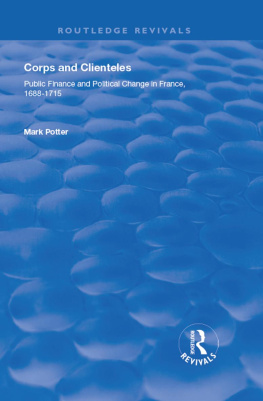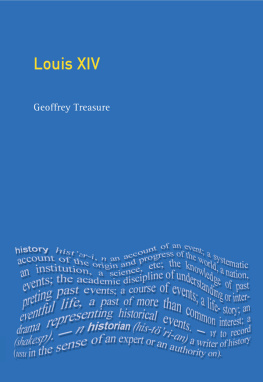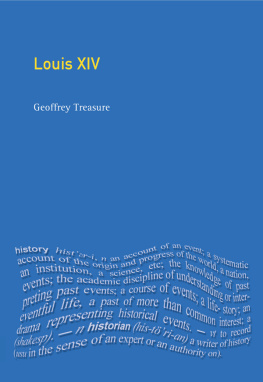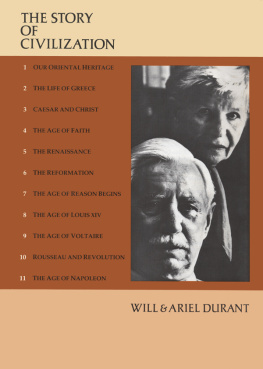CORPS AND CLIENTELES
La grande despence me fait beaucoup de peine; mais il y en a de ncessaires
Great expenses cause me much pain, but there are those that cannot be avoided
(Louis XIV to Colbert, June 1683)
Corps and Clienteles
Public Finance and Political Change in France, 16881715
MARK POTTER
University of Wyoming, USA
First published 2003 by Ashgate Publishing
Reissued 2019 by Routledge
2 Park Square, Milton Park, Abingdon, Oxon, OX14 4RN
52 Vanderbilt Avenue, New York, NY 10017
Routledge is an imprint of the Taylor & Francis Group, an informa business
Mark Potter 2003
The author has asserted his moral right under the Copyright, Designs and Patents Act, 1988, to be identified as the author of this work.
All rights reserved. No part of this book may be reprinted or reproduced or utilised in any form or by any electronic, mechanical, or other means, now known or hereafter invented, including photocopying and recording, or in any information storage or retrieval system, without permission in writing from the publishers.
Notice:
Product or corporate names may be trademarks or registered trademarks, and are used only for identification and explanation without intent to infringe.
Publishers Note
The publisher has gone to great lengths to ensure the quality of this reprint but points out that some imperfections in the original copies may be apparent.
Disclaimer
The publisher has made every effort to trace copyright holders and welcomes correspondence from those they have been unable to contact.
A Library of Congress record exists under LC control number:
ISBN 13: 978-1-138-70925-6 (hbk)
ISBN 13: 978-1-315-19833-0 (ebk)
Contents
Do we need yet another book on French public finances in the seventeenth century? Franoise Bayard, William Beik, Richard Bonney, James Collins, Julian Dent, Daniel Dessert and Alain Gury have each covered this ground quite thoroughly, and because of their works our understanding of French finances in the Old Regime surpasses that of any other European country in the early modern era. Indeed, without the contributions of these historians, my work would not have been possible. I did not set out to revisit the findings of these scholars, nor, to be sure, was it ever my intention to reconstruct figures for the receipts and expenditures of the French crown. Instead, I seek here to fill an historiographical gap while charting some new ground in our understanding of the French absolutist state. The final decades of Louis XIVs reign have indeed been largely overlooked by historians of both French public finances and absolutist state development. In relying on the financial intermediation of privileged corps to pay for the costs of war, the French crown in this period embarked upon a political and financial experiment that, while short-lived in duration, affected the financial options and decisions of Louis XIVs successors through to the end of the Old Regime. It is thus from this vantage point that I am able ultimately to draw my conclusions regarding warfare and state development. My overriding interest in this work is to investigate how both historical and structural constraints interacted to shape the crowns options for financing war. It is that intersection of the historical and the structural, I argue, that guided political change in early modern France.
There are many to thank for lending help and support to this project, and my gratitude and appreciation extend far. Generous financial support provided by a Fulbright fellowship made possible the research that forms the foundation of this project. I was able to follow this up with further research funded by the College of Arts and Sciences at the University of Wyoming.
While in France, Alain Gury, Robert Descimon, Anette Smedley and Gilles Postel-Vinay all took time from their own responsibilities to lend valuable guidance to my research, addressing everything from the most mundane questions that I had to the more complicated matters of reading, digesting and analysing a mass of archival sources.
In the U.S., I have been fortunate to find the support and expertise of a number of experienced scholars. The first incarnation of this work came in the form of my Ph.D. dissertation, and at that stage the contributions of my dissertation codirectors, Robert Brenner and Geoffrey Symcox, were valuable and irreplaceable, and their intellectual influences remain notable throughout this present work. While their comments, suggestions, and probing questions were instrumental to producing a quality dissertation, equally important was the high level of intellectual rigor that they demanded of me from the very beginning of my graduate career.
Jean-Laurent Rosenthal has been instrumental throughout the life of this project. By demonstrating his confidence in me at a very early stage of my academic formation and agreeing to form a lasting research partnership that has run parallel to this project, Jean-Laurent has helped me to develop the experience and skills, not to mention the confidence, necessary to undertake the distinct body of research that went into this work. His influence, too, can be found throughout this study, but I should note that Chapter Six in particular would not have been possible without his generous intellectual and material support. Likewise, Phil Hoffman and Naomi Lamoreaux gave generously of their time to read drafts and provide comments on this project at various points throughout its life.
Since I turned to the occasionally arduous task of transforming the dissertation into this present monograph, several scholars and colleagues have helped tremendously in the completion of the project. Bill Beik, Gail Bossenga, Al Hamscher, John Hurt, Sharon Kettering and Julian Swann each provided feedback, encouragement and advice at one point or the other. Much of that interaction came at the indispensable annual meetings of the Society for French Historical Studies. Colleagues at the University of Wyoming who took part in the Colloquium on History, Culture and Society also provided useful comments on drafts of chapters.
My cohort of French historians who completed their graduate studies at roughly the same time as I and who, like I, have been confronting the challenges of establishing themselves within the profession have given me both moral and intellectual support, without which I would have arrived at this point in my career only with great difficulty. These include Megan Armstrong, Sara Beam, Michael Breen, Greg Brown, Sara Chapman, Steve Miller and David K. Smith.
Tom Gray at Ashgate Publishing deserves my gratitude for giving this project the chance to see the light of day from within the world of published books.
For many years, I have looked upon my brother Jim as a model of academic rigor and accomplishment, and it is to him that I dedicate this book.
Warfare and its impact on the absolutist state is a topic that continues to merit investigation. At the expense of greater nuance and sophistication in their analyses, historians of French absolutism have tended to gravitate toward two schools of thought, neither of which is sufficient on its own. One group of historians, focusing particularly on eighteenth-century developments, has tended to characterize French absolutism as an unwieldy state system that handicapped France in the international arena.1 The institutions and structures of absolutism, they argue, raised the costs of borrowing well beyond what Frances rivals paid to finance war, and the proliferation of privilege erected political barriers to increasing taxation and reforming political institutions.2 Alternatively, historians approaching absolutism from the perspective of the first half of the seventeenth century leave us with an image of the absolutist state responding to the exigencies of war by undermining privileges, erecting powerful new branches of government and violating provincial liberties all in a search for increased revenues.3 Absolutism by one account was weak and inflexible; by the other it was an unconstrained Leviathan.4











